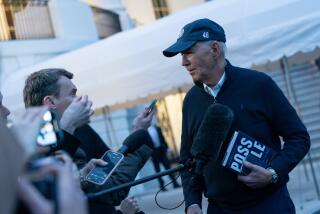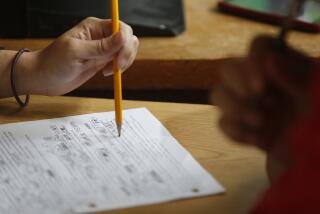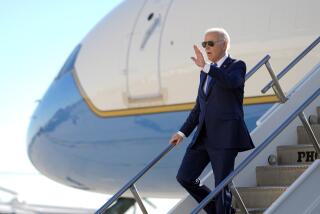Great Read: At memory competition, the diverse contestants are unforgettable
Each morning, Brad Zupp puts on noise-canceling headphones and a pair of goggles, the lenses blacked out except for tiny peepholes that keep each eye focused downward. He sits at his desk, shuffles a deck of playing cards and gives himself 70 seconds to memorize the order.
Zupp then sets a timer and grabs another deck to see how fast he can duplicate the order of the shuffled cards.
His fastest time so far: 65 seconds.
“I don’t do anything bizarre,” said Zupp, who performs this drill at least 10 times a day.
But what’s normal to Zupp and other contestants on the Memory Championship circuit can seem bizarre to those of us who habitually forget to buy milk at the store, who zone out on names at cocktail parties and who don’t remember birthdays or anniversaries until the day has passed.
We don’t meet a man named John and see a toilet. We don’t kill time on the exercise bike memorizing every U.S. ZIP Code. We don’t carry lists of 200-digit numbers and practice memorizing them while in line at the grocery store.
Memory competitors do.
On a rainy Saturday in March, 65 of them gathered in a Manhattan office tower for the 17th USA Memory Championship, one of several such contests held each year around the world. For nearly eight tense hours, they scrambled to rearrange playing cards, match names with faces of strangers, recall random numbers, and memorize a 25-line poem and write it down word for word, with the exact punctuation and line breaks.
There were dentists, students, nurses, teachers, writers and magicians. They ranged in age from 16 to 50, and they seemed to have little in common beyond their passion for memorization and their strenuous training routines, which usually involve sitting in isolation for several hours a day practicing.
Most assign visual images to just about everything and create places in their minds to store those pictures, which serve as memory triggers.
Sue Jin Yang, a nurse in San Francisco, calls it the cookie crumb method.
“I imagine that I am walking a pathway … stopping at distinct locations, dropping off ‘cookie crumbs’ of visual images,” said Yang, 32, who was competing in New York for the third time.
When Yang needs to recall something, she envisions walking the path — which she models after a familiar place — and stopping at specific locations to retrieve the correct cookie crumbs.
Yang’s system associates numbers with sounds and letters. That nudges Yang to remember her chosen images, which tend toward famous faces. For example, three is associated with “m,” one with “d.”
“So when I am given a digit such as 31, I see actor Matt Damon,” Yang said. “Sixty-two is Sean Penn.”
She sees Brad Pitt in the nine of spades and Oprah Winfrey in the six of clubs.
Images, when tied together, can lead to phantasmagorical sequences.
Lance Tschirhart, 25, a competitor from Texas, explained how the number 141251213 is embedded in his memory: 141 brings to mind a dart; 251 is an electrical outlet; 213 is a nutmeg.
“So I can imagine throwing a dart into an outlet and sparks shooting out around a nutmeg,” Tschirhart said during a break between drills in the competition.
Contestants nodded knowingly. Spectators looked baffled.
“You have to use your imagination,” Tschirhart said.
Tony Dottino, a business consultant, started the contest in New York after he had drinks with a friend who told him about a memory competition in London. Dottino, 66, always was intrigued by the mysteries of the brain and coaches clients — most in the healthcare industry — on the value of adopting techniques to improve memory. Nurses who can recall patient details — whether they fear needles, for example, or have hard-to-find veins — lead to greater patient satisfaction, Dottino said.
The first New York contest, in 1997, drew 18 contestants. The winner was Tatiana Cooley, a secretary who joined the competition minutes before it began. Last year, Ram Kolli, a business consultant from Los Angeles, beat the reigning champion, mountaineer Nelson Dellis, who had won the previous two years.
Other winners have included Ron White, a war veteran who prevailed twice and who has memorized the name and rank of every U.S. service member killed in Afghanistan; and Scott Hagwood, who competed after doctors warned that radiation treatment for his thyroid cancer could hurt his memory. Hagwood won four years straight from 2001 to 2004.
The competition has changed little, but contestants have become quicker year by year.
In 2009, White had the fastest time for replicating the order of a deck of shuffled cards: 87 seconds. This year, Johnny Briones, a 19-year-old student at Colorado’s School of Mines, did it in 60 seconds, a record in the U.S. contest. (The world record of 21.19 seconds was set in Germany.)
Karen Pinson, executive director of the Memory Championship, led competitors through each drill, calling out orders as she paced back and forth.
“Mental athletes, start shuffling!” “Three, two, one, go!” “Time is up, mental athletes!”
Competitors sat side by side at long tables. Many wore headphones to mute the noise. They avoided looking at one another or the audience, which by day’s end was standing room only.
Zupp, a financial advisor turned motivational speaker who lives in upstate New York, started training about five years ago because, like many competitors, he feared becoming forgetful with age.
“I would find myself walking into a room and going, ‘OK, why am I here?’” Zupp, now 45, said. “I thought, ‘If this is my memory at 40, what am I going to be like at 50?’”
Luis Angel Echeverria, 24, of Irvine began working on his memory as a teenager. His grades were in the gutter and he was in danger of losing his job with a cable company.
“I’d be up on a roof installing a dish, and I’d have to go down the ladder to the van because I’d have forgotten a tool,” Echeverria said. By the time he reached the van, he couldn’t remember which tool he needed.
In the run-up to the competition, Echeverria practiced several hours a day, scanning cards, printouts of numbers, names and poems, and then pulling a pair of blue eyeshades over his face as he tried to recall them.
The brightly lighted auditorium where the event took place was hushed as nervous contestants awaited the next drill. A young man bit his fingernails. A woman gnawed on the end of her sweater.
Echeverria put his elbows on the table and clutched his shaved head in his hands as he tried to remember card orders. His best time was 2 minutes and 40 seconds.
“I could have done better,” Echeverria said afterward.
The field narrowed to eight finalists. Echeverria and Yang were eliminated, but Briones, Zupp, Dellis and Tschirhart remained in the running.
The finalists sat side by side onstage after being given 15 minutes to study a list of 200 words. They passed a microphone down the row, each calling a word in the order it was listed.
“Architecture,” Briones said when the microphone came to him on its fifth trip down the line. The right word — the 36th — was “architect.” Briones was out.
Zupp fell next, uttering “light bulb” instead of “bulb.”
Alexander Mullen, 21, a student from Oxford, Miss., lasted longest after Dellis faltered on the 131st word. Mullen remembered it correctly as “daisy.”
After another drill, the field was down to Dellis and Mullen. The last event, card memorization, would determine the champ.
The two took turns reciting in order the decks that they had studied for five minutes. Dellis hesitated on the 16th before correctly calling it: “Ace of hearts.”
The audience gasped in relief.
At card 66, Mullen sat silently, clutching the microphone and staring at the floor. Fifteen seconds passed. Mullen could not summon up the image of the card. “Time,” the judge said.
Dellis, who had been hunched forward, slowly sat up, tension lifting from his shoulders. He shook Mullen’s hand as the crowd applauded.
“It feels amazing,” said Dellis, 29, who became a fixture at memory competitions after his grandmother died in 2009 of Alzheimer’s disease. Dellis runs a nonprofit to raise money for Alzheimer’s research.
Cameras flashed as he held up his prizes: an expensive fountain pen and a trophy of a sea horse, whose shape resembles the part of the brain linked to memory.
There was no cash, no trip to a tropical isle, no Hollywood contract.
But for competitors, who consider these contests the mental Olympics, the trophies, bragging rights, elevated confidence and occasional book deal are worth the effort.
And lest anyone assume that mental athletes never forget, Echeverria, who finished in 18th place, proved that even the best-trained have absent-minded moments.
He forgot to put his name on the pages he used in the contest’s first drill. As the judge called time, Echeverria quickly scribbled it down, with seconds to spare.
More to Read
Start your day right
Sign up for Essential California for news, features and recommendations from the L.A. Times and beyond in your inbox six days a week.
You may occasionally receive promotional content from the Los Angeles Times.







